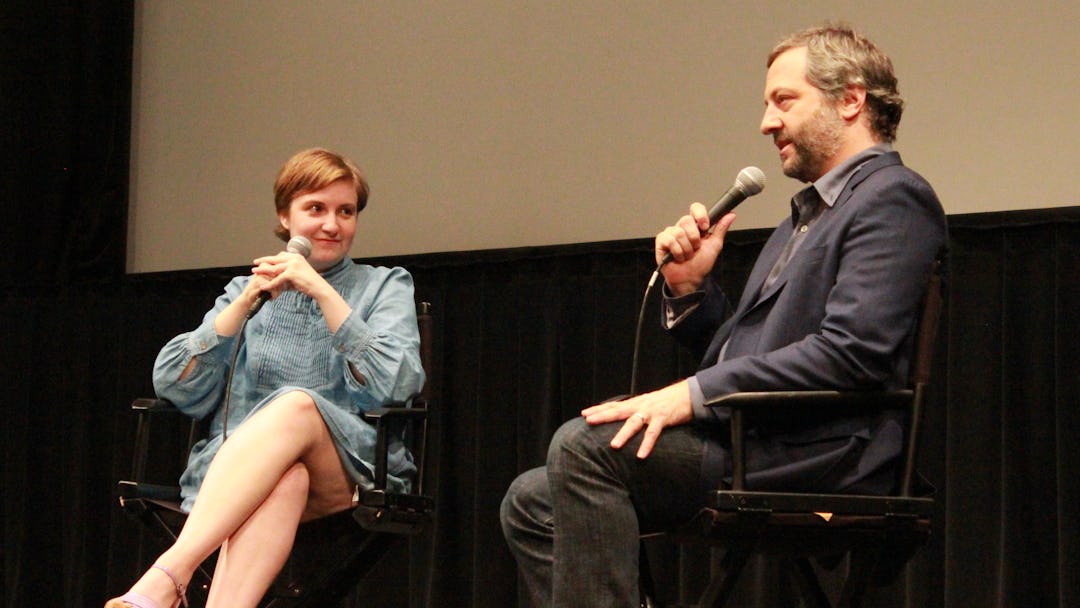Last night, as part of the Film Society of Lincoln Center’s pre- Trainwreck retrospective “I Found This Funny: The Comedy World of Judd Apatow,” the ubiquitous writer/producer/director sat down on the Lincoln Center stage for a loose, chatty, often hilarious conversation with his frequent collaborator Lena Dunham. Apatow had a giggle or two at the expense of the venue (“I know we’ve gotta rush and get Matewan on or something,” he joked, adding, “Just feeling out for the ‘Film Center’ jokes”), while Dunham confessed during the Q&A, “This is the space in which I’m most afraid to run into people I’ve had sex with — there’s a lot of, like, bearded guys in the back that look familiar to me?” And while they hit many of the expected topics — stand-up comedy, feminism, Taylor Swift, Bill Cosby (asked if she’d participate in a “roast” of Cosby, Dunham fired back, “If Bill Cosby agreed to be roasted on a spit, I would participate”) — many audience members were clearly writers and filmmakers looking for advice, which prompted some valuable insights.
Both filmmakers recalled key moments of validation that came early, when they most needed them. Apatow remembered an 11th-grade autobiography assignment where “I just made it up, completely” (“I said that I really was in the CIA, and I was undercover, and I talked about all my affairs with the teachers…”), which got him an A and the comment, “You could be a writer, you could be like Woody Allen.”
Dunham remembered writing a poem in seventh grade “about being angry at my therapist… I remember the last line was, ‘You are not my mother/ You will never be my mother.’” She submitted it to the Scholastic Writing Awards, and “I got the Silver Key in Poetry, which was just the greatest thing that ever happened to me. And I didn’t have many friends, but I had this one friend named Harris Sullivan, and he was gay, and I was weird, and he won the Gold Key. And we got to go to the ceremony, and our parents took us out for Indian food, and it was just like, ‘We’ve really done it.’”
Asked about their writing process and habits, Apatow confessed, “We’re very different. Lena loves to write, so when she’s having a bad day, she’ll go write to feel better. When I write, I feel like I am facing a mirror and it’s telling me of my unworthiness. So I will avoid that space, by watching, y’know, a DVD of the third season of The Real World or something.”
“I love writing,” Dunham admitted, “but of course there’s days where we all avoid doing the thing that we’re supposed to do.” And she notes that her writing habits and routine have changed. “When I was younger, in college, I’d start writing at midnight, and write until 6 AM, and go to sleep for five hours, and wake up. But you have to start tuning yourself — and to say ‘like an athlete’ is a real exaggeration, but you have to start conditioning yourself to write every day and preserve your thoughts and to recognize that there’s going to be days where you don’t feel like doing it and you have to, and there’s going to be days when you do feel like doing it and you can’t, and you have to find ways to preserve those ideas.”
And then she dropped the bombshell: “I’ve literally found that sleeping well, and eating three meals, and exercising occasionally is the best thing that you can do as a writer. And read. That’s it. That’s all you have to do.”
Apatow strenuously objected to one part of that formula — “I find I don’t enjoy exercising; I don’t like sweating, I don’t like moving fast, I don’t like counting, I don’t wanna count to 12 a bunch of times in a row, I have no pride in physical feats, I don’t think running fast is impressive, and I think writing a new boner joke is” — but concurred on the rest. “I think David Milch always says that if you write at the exact same time every day, it trains your brain to turn on. And his feeling is to not think about writing when you’re not writing. He says talking about writing is like talking about exercise — if you’re not doing it, it really means nothing. And so he says, say you write from nine to 11 every morning, after a while your brain will just be wired to start writing, and that’s a good habit to get into.”
And on the question of how to make it, how to break in to the business of show, the advice is (predictably, but truthfully) to just do it yourself. “Whenever I talk about how to get a job and how to do things, I always talk about Lena, because Lena made a movie,” Apatow said. “Lena did the thing that most people don’t do: she got a crappy video camera and a drunken friend and made a movie, and then she made another movie, and then she found a friend who wasn’t drunk to hold the camera. And for $40,000 she made Tiny Furniture, which looks like a million-dollar movie, looks beautiful… And so she just made something. I feel like everybody’s waiting for a job — y’know, you can make a movie on your phone. And so there really is no reason to worry about how to get in with people — and you can do that, there’s a lot to learn working for people — but you can just make a movie, where in the old days that was completely impossible.”
Apatow’s Trainwreck premieres tonight at Lincoln Center and opens Friday everywhere.
